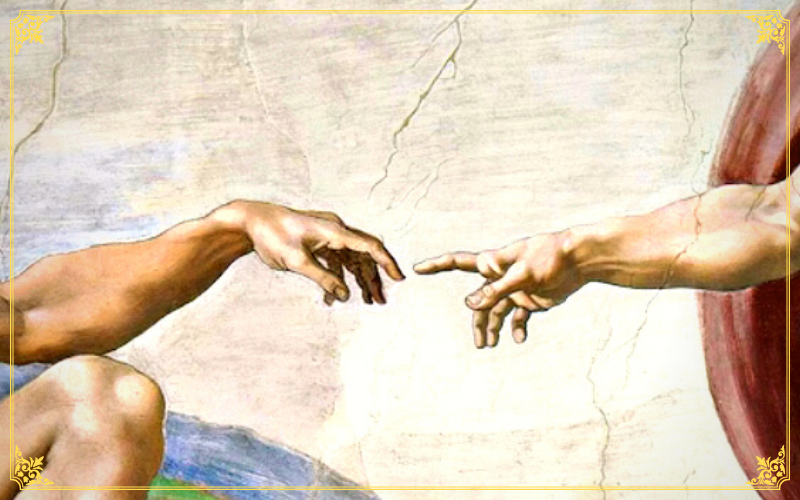How can I grow in holiness? How can I grow in sanctity? How can I help my family and friends to be holy? These are all great questions, and the answer is rather straightforward even though there are hundreds of self-help books, essays, videos, podcasts, and other mediums of content on this same topic. It all boils down to [1] conformity to God’s Will and [2] growth in grace.
In Divine Intimacy, Father Gabriel of St. Mary Magdalen writes:
“Conformity to God’s will and the growth of grace in us are the two constituent elements of sanctity and of a life of union with God. These two elements are inseparable, for one depends upon the other. Our increase in grace corresponds to our degree of conformity to God’s will.”
Step 1: Obey the Commandments
The first element of a life of sanctify is one that eschews sin and therefore is a life lived in the state of sanctifying grace. At the moment of death, the presence or absence in our soul of sanctifying grace will determine if we are sentenced to an eternity in hell or not. It is really that simple. We therefore must obey the Commandments of God and the Commandments of the Church (i.e., the Precepts) and reject all mortal sin. Sanctifying grace is introduced into the soul at the moment of one’s Baptism. If we fall into sin after our Baptism, we must have recourse to the Sacrament of Confession. We should also avoid all venial sins[1] which, while not damning a soul, are nonetheless offensive to God and which can harm our souls.
Father Gabriel thus continues:
“Jesus said, ‘If anyone love Me, he will keep My word…and We will come to him, and will make Our abode with him’ (Jn 14,23). ‘Keeping His word,’ that is, obeying God’s will as manifested in the commandments, is the condition necessary for living in the state of grace and, hence, for everyone the presence of the Blessed Trinity in our soul. The more complete our conformity to God’s will becomes, embracing not only the grave precepts, but also the smallest details of the divine law, so as to exclude not only mortal sins, but even venial sins and the slightly voluntary imperfection…”
Our Lady of Fatima asked us to cease offending God. This really is the absolute first step in faithfully living the Message of Fatima. We must remain in the state of grace and not offend Our Heavenly Father Who is already too much offended. When Sister Lucia asked Our Lord what penance we should do, He replied that we must each perform the duties of our state and keep God’s commandments. This really is nothing more than ‘baseline’ Catholicism, yet how many do not even keep this minimum?
Step 2: Growing in the Life of Grace
Beyond avoiding sin and remaining in the state of grace, we can grow in grace by living out the Catholic Faith to a higher degree through gaining indulgences, increasing our prayers and good works, assisting others in their Faith, spreading the Message of Fatima to save souls, and other such initiatives. Our Lord has said, “In My Father’s House there are many mansions” (John 14:2, illustrating that in Heaven, just as on earth, there are different degrees of glory among the faithful. We can grow in grace and gain merits, though only for actions performed while in the state of sanctifying grace.
Hence, the second way to grow in sanctity is to gain merits. Father Gabriel continues his reflection:
“…the more we try to seek God’s good pleasure in everything and accept all the circumstances of our lives as His will, the more the life of grace grows and develops within us. The three divine Persons, on Their part, give Themselves more and more to our souls, establishing Their in-dwelling ever more fully and profoundly, thus drawing us to greater union with Themselves. Then is fulfilled in us the word of Jesus: ‘He that sent Me is with Me, and He hath not left Me alone, for I do always the things that please Him’ (John 8:29).”
Put another way, we must strive to do more than the minimum required to avoid sin. Hence, we have a responsibility to strive to observe the stricter fasts of former times and to pray the Rosary daily and make the First Saturday Devotion. It is not sinful if we fail to do so, but we must, in some areas, go beyond the mere minimum of the law, as stated in Practical Meditations For Every Day of the Year:
“It is the constant teaching of all the masters of spiritual life that, to make progress in the ways of perfection, we must add that which is of supererogation to that which is of obligation, not only in matters of piety, but in mortification, charity, zeal, and all other virtues. Have I followed this rule? Have I not, on the contrary, confined myself to what is of strict obligation, and thus deprived myself, by being illiberal towards God, of the gifts of His bounty? The danger of such conduct is that we run the risk of often being unfaithful to what is of obligation.”
As We Grow in Sanctity, We Can Help Others
Our Lord said, “Cast out first the beam in thy own eye, and then shalt thou see to cast out the mote out of thy brother’s eye” (Matthew 7:5). Haydock’s Catholic Bible Commentary states on this verse: “Correct first thy own greater faults, before thou censure the lesser failings of others.” And in a similar sense, we can only help others grow in holiness and sanctity if we first do so. Thus, Father Gabriel further adds the following insight:
“First of all, we must cooperate with grace, so that the fruits of redemption can be fully applied to our souls. This is the work of our own personal sanctification. It is not limited to this one aspect, however. We are called to sanctify ourselves in order to be able to bring others to sanctity. Each one of us has a mission to fulfill for the good of others and for their sanctification. We must collaborate with Christ in extending the fruits of the Redemption to as many souls as possible.”
Therefore, let us not overly complicate how we can become holy. We can become holy by imitating Our Lord’s life more and more each day. We have the Blessed Virgin Mary and the saints as examples to follow. And all of them ultimately won Heaven by the twofold plan of living and dying in sanctifying grace while also growing in the life of grace.
In the final analysis, this too is what Devotion to the Immaculate Heart of Mary is about. As devotees of Our Lady of Fatima know, the Message of Fatima focuses us upon the Immaculate Heart of Mary. Our Lord wants the whole Church to practice this devotion. One who is devoted to Her Immaculate Heart not only has love and reverence for Our Lady, not only proclaims Her honors to all, but above all, strives to imitate Our Lady. In other words, his heart becomes more and more like Her Heart. As St. Louis de Montfort tells us, to live as She lived is true devotion. And Our Lady always conformed Herself perfectly and completely to God’s Will (cf. Luke 1:38, John 2:5). She kept all the Commandments never ceased to grow in grace and merit. She is immaculate.

Prayer of St. Francis of Assisi for Each Day
Lord, help me to live this day, quietly, easily. To lean upon Thy great strength, trustfully, restfully. To wait for the unfolding of Thy will, patiently, serenely. To meet others, peacefully, joyously. To face tomorrow, confidently, courageously.
ENDNOTES:
[1] As stated in The Three Ages of the Interior Life by Father Garrigou-Lagrange. Mortal sins must be confessed in number and in kind and cause. They must be confessed along with sincere contrition. Venial sins committed with full deliberation are a serious obstacle to perfection. Fully deliberate venial sin, when not rejected, is like a poison that slowly kills an organism. We must also guard against semi-deliberate venial sins, which are committed with less reflection and into which there enters a certain amount of surprise and impulse. Lastly, sins of frailty are committed because of human weakness and the will has only a small share in them. They are atoned for quickly and are not a serious obstacle to perfection, but we must seek to diminish them in number.




